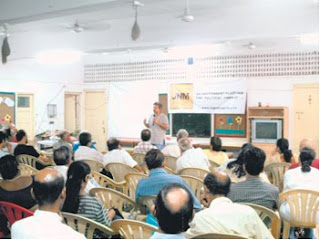
A couple of weeks back (13th Sept), I was part of a very interesting and possibly historic event.
The event was held at Mumbai by Jagrut Nagrik Manch (JNM), a Mumbai based activist NGO, to elect a Citizen’s Consensus Candidate for Andheri (W) constituency for the upcoming Maharashtra assembly elections.
The decision to elect a Citizen’s Consensus Candidate (CCC) was an outcome of the frustration experienced by JNM and its partner civil society groups that were active in Andheri / Juhu area, due to the apathy of successive governments and elected representatives. To use their words, they felt “the time for requests is over, we need direct action”.
This isn’t a completely new idea though. JNM and other civic groups (including Lok Satta Aandolan and Janaagraha) had participated in a similar campaign called Vote Juhu campaign during the 2007 municipal elections in Mumbai. Local activists from Juhu ward chose to support one of the popular citizen leaders - Adolf D’Souza, who went ahead to win the election handsomely.
So now JNM set itself to repeat this task though at a much larger scale, that of an Assembly Constituency with over 200,000 voters. This had never been attempted before, and that is why this event could go down in history if successful.
Very briefly, following is what unfolded at the event:
- 4 candidates had decided to stand up for becoming the CCC. The candidates were interviewed by a panel, followed by an election to choose the CCC
- Electoral College included Area Sabha representatives / local activists from 157 polling booths of Andheri (W) constituency. They had all pledged to campaign for the winning CCC
- All candidates were asked to pledge for a “Right to Recall” before the election results were announced, which all of them did
- The winner was Hansel D’Souza, who won by a whopping margin of 117 votes!
The event was well covered by the media – HT, DNA and Times of India.
I participated in this event as a panelist representing Janaagraha. Co-panelists were some truly admirable people – Dr L C Jain, Shabana Azmi, Ajit Ranade (ADR), Adolf D’Souza, Manish Sisodia (Parivartan) etc. Our role was to challenge the candidates with questions.
The best question (I think) came from none other then Dr L C Jain. To the first candidate who came on stage, he asked “The JNM video played at the beginning of this event spoke about us needing to protect our constitution…. My question to you is – have you read the Indian constitution?” The answer came as “Hmmm... only in bits”, which wasn’t received too well by Dr Jain or the audience.
After the winner was announced, Mayank Gandhi (Founder, JNM) made a passionate appeal to all members in the audience (mostly local activists) to take a week’s leave from their work prior to election day for campaign work. The energy in the air and emphatic mood of the crowd and their newly elected candidate Hansel, were infectious.
There were several highlights of this event for me.
First, it was amazing (and surprising to some extent) to see the kind of support Janaagraha has in Mumbai. This is largely due to the role Janaagraha played in bringing about the Nagara Raj bill or Community Participation Law (CPL). I had perceived this to some extent last year too during the outreach activities of Jaago Re! One Billion Votes campaign. Of all the cities in India, I think Mumbai seems most excited and knowledgeable about CPL!
Second, it was wonderful to see a small democratic process throw up a genuine and capable candidate – Hansel D’Souza. Informed participation at its best!
The greatest takeaway from the evening however was the experience of how passionately JNM and other participating groups were involved in this exercise. It is so rare these days to see hundreds of educated urban citizens – young and old – turn up on a Sunday evening on the promise of bringing about change. Yet, the event hall was full with more than 300 people, all raring to hit the campaign trail the immediate next day.
If this exercise is successful, it would throw up one good MLA in an assembly of 288 MLAs. Partisan politics will always ensure that this MLA would have little say in the affairs of the state. Yet, I feel it is a worthwhile and much needed attempt in state level politics. Besides prodding the existing political setup, it would serve as a role model for what citizen groups, anywhere in India, could achieve when they choose to work together with passion, dedication and towards a common goal.






